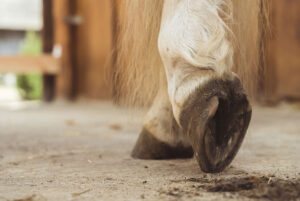Help! Something Bit My Horse

Q: What should I do if I suspect my horse has been bitten by a feral or unknown animal?
A: Skunks, foxes, raccoons, dogs, cats, horses, and humans can become infected with rabies from a bite wound. Rabies is a threat for our equine companions because they live in the outdoors where the skunk, fox, and raccoon reside.
Saliva carries the rabies virus from one mammal to another through bite wounds. The virus eventually travels to the brain, and within days of reaching the brain the serious affects of the virus become apparent.
Most of the time in the horses we see the “stuperous” type of rabies case, with clinical signs including depression, anorexia (not eating), circling, and inability to swallow. Less common in horses is the “furious” rabies type, which results in an aggressive, hyperexcitable, and/or fearful animal.
The time period from exposure to the onset of disease varies depending on the bite location, type of rabies virus that was transmitted, and the status of the animal’s immunity.
And, as we know horses can get into trouble anywhere and anytime, which then summons the expertise of the equine veterinarian to either suture these magnificent animals back together or help heal and repair wounds. Horses have an innate curiosity and then you add the fact that they live in the environment that would allow them to interact with rabid critters. All this combined would make any horse owner suspicious of bite wounds found on her beloved equine.
So back to the question, “What should one do if they suspect their horse has been bitten by an unknown animal?”
Give all wounds a thorough cleaning—including lavaging puncture wounds—with either a betadine or chlorhexidine solution. Then call your veterinarian.
If possible, capturing the animal that bit your horse to have it quarantined or tested for rabies is helpful in determining if your horse was exposed or not. The only test for rabies is a post mortem evaluation of the brain, so ideally you would want to determine if the suspected “wild” animal has the disease before euthanizing your horse. Each state has different guidelines on how to handle suspected rabies cases, and your local veterinarian is the best source of information.
In more than 20 years of practice I have found that most bite wounds are not from rabid animals. In fact, we’re often not even sure they are bite wounds from a mammal at all. They might have come from tree branches, fence posts, insect bites (such as spiders or maybe even a nonvenomous snake). Your best and cheapest protection for your horse against rabies is to vaccinate them. The American Association of Equine Practitioners recommends a yearly rabies vaccine as a core vaccine for every horse. Peace of mind is what we all strive for when it comes to our horses’ health.

Related Articles
Stay on top of the most recent Horse Health news with


















